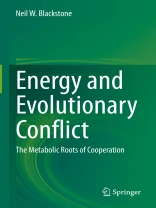In the mid- to late-twentieth century, large scientific conflicts flared in two seemingly distinct fields of scientific inquiry. In bioenergetics, which examines how organisms obtain and utilize energy, the chemiosmotic hypothesis of Mitchell suggested a novel mechanism for energy conversion. In evolutionary biology, meanwhile, Wynne Edwards strongly articulated the view that organisms may act for the “good of the group.” This work crystalized a long history of imprecise thinking about the evolution of cooperation. While both controversies have received ample attention, no one has ever suggested that one might inform the other, i.e., that energy metabolism in general and chemiosmosis in particular might be relevant to the evolution of cooperation. The central idea is nevertheless remarkably simple. Chemiosmosis rapidly converts energy, and once storage capacity is exceeded, an overabundance of product has various negative consequences. While to some extent chemiosmotic processes can be modulated, under certain circumstances it is also possible to simply disperse the products into the environment.
This book argues that these two heretofore distinct scientific disciplines are connected, thereby suggesting that a ubiquitous process of energy conversion may underlie the evolution of cooperation and link major transitions in the history of life that have been regarded as mechanistically unrelated.
Mục lục
Chapter. 1. Introduction.- Chapter. 2. Energy Conversion: How Life Makes a Living.- Chapter. 3. The puzzle of cooperation.- Chapter. 4. A Thumbnail Sketch of the History of Life.- Chapter. 5. Early insights: a fascination with metabolic gradients.- Chapter. 6. How can metabolism lead to groups?.- Chapter. 7. Chemiosmosis and the origin of eukaryotes.- Chapter. 8. Chemiosmosis and modern symbioses.- Chapter. 9. The evolution of multicellularity.- Chapter. 10. Metabolism and multicellularity revisited.- Chapter. 11. Metabolic vestiges of conflict mediation in modern biology.- Chapter. 12. Conclusions.
Giới thiệu về tác giả
Neil W. Blackstone is a Professor in the Department of Biological Sciences at Northern Illinois University. His research seeks to employ evolutionary principles to provide a predictive framework for both current ecological interactions and interactions that occurred earlier in the history of life. He has published over 90 articles and 2 books.












